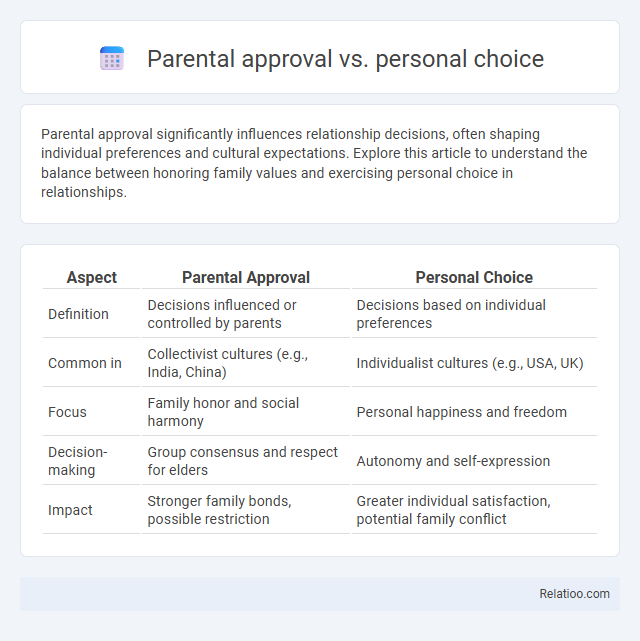Parental approval significantly influences relationship decisions, often shaping individual preferences and cultural expectations. Explore this article to understand the balance between honoring family values and exercising personal choice in relationships.
Table of Comparison
| Aspect | Parental Approval | Personal Choice |
|---|---|---|
| Definition | Decisions influenced or controlled by parents | Decisions based on individual preferences |
| Common in | Collectivist cultures (e.g., India, China) | Individualist cultures (e.g., USA, UK) |
| Focus | Family honor and social harmony | Personal happiness and freedom |
| Decision-making | Group consensus and respect for elders | Autonomy and self-expression |
| Impact | Stronger family bonds, possible restriction | Greater individual satisfaction, potential family conflict |
Understanding Parental Approval: Why It Matters
Understanding parental approval is crucial as it shapes a child's values, decision-making, and emotional well-being, influencing lifelong relationships and self-esteem. Parental approval often provides a sense of security and validation, reinforcing positive behaviors and guiding personal choices effectively. Navigating the balance between seeking parental approval and exercising personal choice leads to healthy autonomy and mutual respect in family dynamics.
Defining Personal Choice in Young Adulthood
Personal choice in young adulthood signifies the ability to make independent decisions that reflect one's values, goals, and identity, distinct from parental approval. It involves asserting autonomy while balancing respect for parental guidance and cultural expectations, often shaping career paths, relationships, and lifestyle decisions. Defining this autonomy is critical for emotional growth, fostering self-confidence and responsible decision-making during the transition to adulthood.
Cultural Perspectives on Family Influence
Cultural perspectives on family influence often emphasize parental approval as a cornerstone of decision-making, reflecting values of respect and collectivism prevalent in many societies. Your personal choice may be shaped or constrained by these cultural norms, where family opinions carry significant weight in life decisions such as marriage, education, or career paths. Balancing parental approval with personal autonomy requires navigating complex social expectations that vary widely across cultural contexts.
The Psychology Behind Seeking Parental Consent
Seeking parental approval often stems from deep-rooted psychological needs for security and acceptance, influencing decision-making processes significantly. Personal choice may conflict with these desires, causing internal tension as individuals navigate the balance between autonomy and familial expectations. Understanding the psychological mechanisms behind this dynamic reveals how attachment styles and cultural factors shape the importance of parental consent in personal decisions.
Conflicts Between Tradition and Individuality
Conflicts between parental approval and personal choice often arise from deeply rooted traditional values clashing with individual aspirations for autonomy. Your struggle to balance honoring family expectations and asserting personal identity highlights this tension, especially in cultures prioritizing collective harmony over self-expression. Navigating these opposing forces requires understanding the significance of parental guidance while advocating for your unique path in life.
Navigating Disagreements: Communication Strategies
Effective communication strategies for navigating disagreements between parental approval and personal choice emphasize active listening and empathy to bridge understanding gaps. Framing conversations around mutual respect and clearly expressing individual values helps reduce conflict and foster cooperation. Utilizing open-ended questions encourages dialogue, allowing both parties to explore perspectives and reach compromises.
The Impact of Parental Approval on Relationships
Parental approval significantly influences relationship dynamics by shaping individual confidence and social acceptance. Your emotional well-being and decision-making can be affected by the level of support or disapproval from parents, often impacting long-term commitment and stability. Balancing personal choice with parental expectations is crucial for maintaining healthy and fulfilling relationships.
Balancing Respect and Independence
Balancing respect and independence involves recognizing the importance of parental approval while asserting your personal choice in decision-making. Prioritizing open communication helps maintain trust and understanding, allowing you to honor your parents' perspectives without compromising your own autonomy. Finding this equilibrium fosters healthy relationships and supports your growth toward self-reliance.
When to Prioritize Personal Choice
When navigating parental approval versus personal choice, prioritize your individual values and long-term goals when decisions impact your happiness and future. Balancing respect for parental input with your own aspirations ensures authentic growth and fulfillment. You must weigh emotional well-being and personal identity above external approval in critical life choices.
Finding Harmony: Merging Values and Aspirations
Parental approval and personal choice often represent divergent priorities, creating a complex dynamic where cultural values and individual aspirations intersect. Finding harmony involves open communication, mutual respect, and empathy to integrate familial expectations with personal goals. Embracing this balance fosters stronger relationships and supports authentic self-expression while honoring parental guidance.

Infographic: Parental approval vs Personal choice
 relatioo.com
relatioo.com